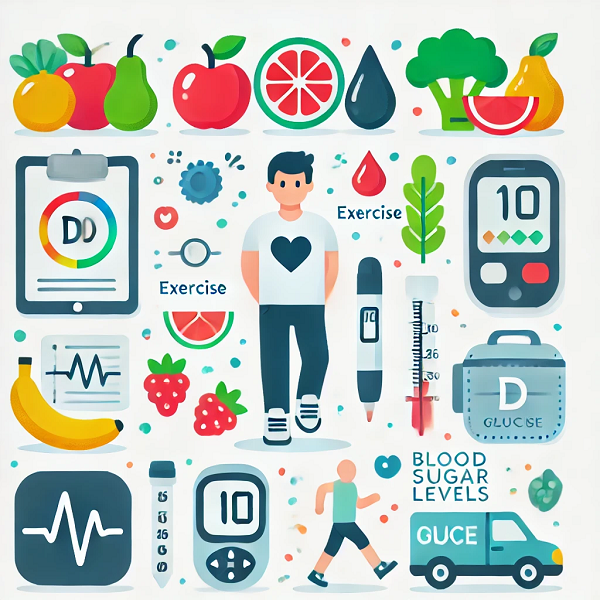Managing diabetes can seem tough, but with the right strategies, you can practice blood sugar control and live a healthy life. In this article, we’ll go over some of the best ways to manage blood sugar and keep diabetes under control. From diet tips to exercise routines, these strategies are easy to follow and can make a big difference.
Understanding Blood Sugar Control
Before we dive into the strategies, let’s quickly go over why controlling blood sugar is important. When you eat, your body breaks down the food into glucose (sugar), which enters your bloodstream. Insulin, a hormone made by your pancreas, helps your body use this sugar for energy. However, if you have diabetes, your body either doesn’t make enough insulin or can’t use it well. This causes high blood sugar, which can lead to serious health problems over time, like heart disease, nerve damage, and kidney issues.
By keeping your blood sugar levels in check, you can prevent these complications and feel better every day.
Top Strategies for Better Blood Sugar Control
Here are some strategies you can start using today to better manage your blood sugar levels.
1. Follow a Healthy, Balanced Diet
Eating the right foods is one of the most important steps in managing diabetes. Choose foods that help keep your blood sugar steady and avoid those that cause spikes.
- Focus on fiber: Foods high in fiber, like whole grains, vegetables, fruits, and legumes, help slow down the absorption of sugar into your bloodstream. This keeps your blood sugar from rising too quickly after a meal.
- Watch your carb intake: Carbohydrates have a big impact on blood sugar. Choose healthy carbs like brown rice, whole-wheat pasta, and quinoa. Avoid sugary snacks, sodas, and highly processed foods.
- Portion control: Eating too much at one time can cause blood sugar spikes. Try to eat smaller, more frequent meals throughout the day to keep your blood sugar levels stable.
2. Stay Physically Active
Exercise is a powerful way to manage your diabetes. It helps your body use insulin more efficiently, which can lower your blood sugar levels. Aim for at least 30 minutes of physical activity most days of the week.
- Walking: Even a 30-minute walk each day can make a difference in your blood sugar control. Walking is a simple way to stay active and improve your health.
- Strength training: Building muscle helps your body burn glucose more efficiently. Try lifting weights or doing resistance exercises 2-3 times a week.
- Make it fun: The key to staying active is finding something you enjoy. Whether it’s dancing, swimming, or biking, choose an activity that makes you feel good.
3. Monitor Your Blood Sugar Regularly
Checking your blood sugar regularly can help you understand how your body reacts to different foods, activities, and medications. Use a glucose meter to monitor your blood sugar levels throughout the day.
- Track your results: Write down your blood sugar readings and look for patterns. This will help you and your healthcare provider make better decisions about your diabetes management.
- Know your target range: Your doctor will give you a target range for your blood sugar levels. It’s important to stay within this range to avoid complications.
4. Take Medications as Prescribed
For some people, lifestyle changes alone aren’t enough to manage diabetes. If your doctor has prescribed medications or insulin, it’s important to take them as directed.
- Stay on schedule: Missing doses can cause your blood sugar levels to rise. Set reminders on your phone or use a pill organizer to help you remember to take your medication.
- Ask about adjustments: If your blood sugar levels are too high or too low, talk to your doctor about adjusting your medication.
5. Reduce Stress
Stress can have a big impact on your blood sugar levels. When you’re stressed, your body releases hormones like cortisol, which can make your blood sugar rise. Finding ways to manage stress can improve your overall health and help keep your blood sugar under control.
- Practice relaxation techniques: Deep breathing, meditation, and yoga are great ways to lower stress levels.
- Get enough sleep: Lack of sleep can increase stress and make it harder to control your blood sugar. Aim for 7-9 hours of sleep each night.
6. Stay Hydrated
Drinking enough water is important for everyone, but it’s especially important for people with diabetes. When you’re dehydrated, your blood sugar levels can rise. Drinking water helps your body remove excess sugar through urine and keeps your blood sugar levels in check.
- Aim for at least 8 glasses of water a day: Make sure to drink more if you’re exercising or it’s a hot day.
- Avoid sugary drinks: Drinks like soda, energy drinks, and fruit juices can cause your blood sugar to spike. Stick to water, unsweetened tea, or drinks with zero calories.
7. Get Regular Checkups
It’s important to work closely with your healthcare team to manage your diabetes. Regular checkups allow your doctor to monitor your blood sugar, adjust your treatment plan, and check for any complications.
- Have your A1C checked: The A1C test measures your average blood sugar levels over the past 2-3 months. This gives your doctor a better picture of how well your diabetes is being managed.
- Check for complications: Diabetes can affect many parts of your body, including your eyes, kidneys, and feet. Regular checkups help catch any issues early before they become serious.
8. Create a Support System
Managing diabetes can be challenging, but you don’t have to do it alone. Surround yourself with friends, family, and healthcare professionals who can support you on your journey.
- Join a support group: Many communities and hospitals offer diabetes support groups where you can connect with others who understand what you’re going through.
- Talk to your loved ones: Let your friends and family know how they can support you, whether it’s helping with meal prep or joining you for a walk.
Mastering diabetes and achieving better blood sugar control is possible with the right strategies. By focusing on a healthy diet, regular exercise, monitoring your blood sugar, taking medications, and reducing stress, you can improve your health and reduce your risk of complications. Remember to stay hydrated, get regular checkups, and lean on your support system for help. Taking these steps can make a big difference in your diabetes management and help you live a full, healthy life.
References:
- American Heart Association: Managing Blood Glucose
- Mayo Clinic: Diabetes Diet: Create your healthy-eating plan
- National Institute of Diabetes and Digestive and Kidney Diseases: Managing Diabetes
- Centers for Disease Control and Prevention (CDC): Diabetes Management and Treatment
- Harvard T.H. Chan School of Public Health: Simple Steps to Preventing Diabetes
#diabetesmanagement #bloodsugarcontrol #healthyliving #diabetestips #balancedlife #diabetesawareness #healthyhabits #stressrelief #monitorbloodsugar #diabetescontrol







